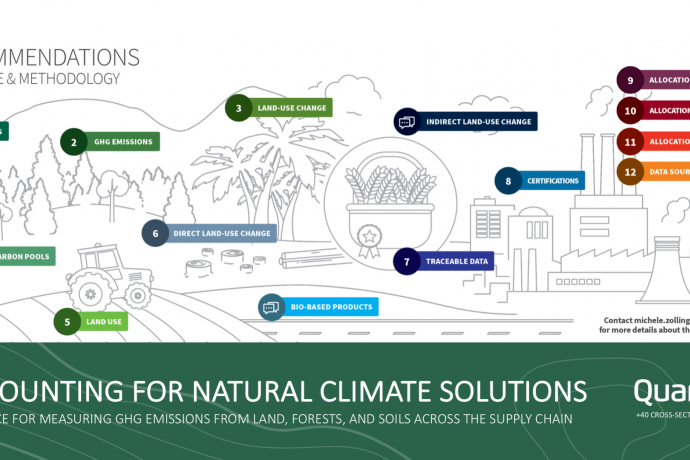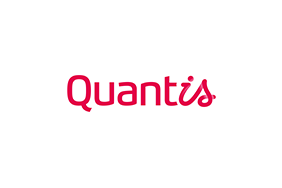Accounting for Natural Climate Solutions Guidance Launches to Support Forest Protection and Soil Restoration As Part of Corporate Carbon Strategies
Published 04-02-19
Submitted by Quantis

The environmental sustainability consulting group Quantis is proud to announce the public release of “Accounting for Natural Climate Solutions: Guidance for Measuring GHG Emissions from Land, Forests, and Soils across the Supply Chain.” The Guidance (previously called the Land Use Change Guidance) provides a robust methodology to effectively measure greenhouse gas (GHG) emissions from land, forests, and soils across the supply chain to be embedded in corporate and product footprints, which can be used for science-based climate target setting efforts.
Indeed, natural climate solutions – from forests, agriculture, soil and land – have been recognized as key levers in mitigating the negative impacts of climate change. According to the IPCC, GHG emissions from agriculture, forestry and other land-use activities account for 24% of global impacts, second only to the energy sector. Half of these GHG emissions can be traced back to land use and land-use changes, including deforestation.
The Accounting for Natural Climate Solutions Guidance was developed within an unprecedented, collaborative multi-stakeholder initiative led by Quantis. More than 40 private companies, NGOs, governments, and scientific institutions banded together to develop a solution to a major challenge: how to effectively and reliably account for greenhouse gas impacts from land and land-use change to ultimately prevent deforestation and to promote soil restoration. After a rigorous pilot process in 2018, the outcome is the robust methodology that is released and publicly available today in a guidance.
This Guidance provides a groundbreaking accounting framework set to transform industries strongly impacted by land-use change – especially food and fashion. The project has already brought together industrial partners including, among others, Atvos, Barry Callebaut, Braskem, General Mills, IKEA, L’Oréal, LVMH, Mars, MondelÄ“z International, PepsiCo, Philip Morris International, and Pirelli. Non-profits, consultancies, investment firms, governmental bodies and research institutes such as ADEME, Ceres, CDP, Climate-KIC, Continuum Textiles, EcoAct, Navigant, Embrapa, Global Canopy, Gold Standard, IINAS, Mercer Environment Associates, moja global, Permian Global, Rainforest Alliance, South Pole Group, Supply Change, Textile Exchange and WWF also contributed to this important work.
“It is inspiring to see so many key players working together to streamline their accounting practices on this urgent issue,” affirms Quantis Global Director, Services + Innovation Jon Dettling. “We knew by building this methodology, we’d usher in a new era for how we tackle land use, land-use change and forestry. Forest protection and soil restoration are now backed by corporate carbon strategies and accounting frameworks. This is an exciting game-changer.”
Forests and soils store large amounts of carbon; therefore, forest burning and soil exploitation contribute significantly to human-made GHG emissions. An increasing number of food and apparel companies are seeking to establish deforestation-free supply chains as part of their efforts to develop a truly sustainable business model. This could only be made possible with science. The Guidance addressed this urgent need for a standardized, scientifically-accurate methodology to include GHG emissions from land, forests, and soils across the supply chain in corporate GHG accounting efforts, action plans and goals by providing 12 key recommendations.
The initiative convened in October 2016 to develop a set of recommendations in a methodology that consolidates, aligns and builds upon pre-existing references. Last year, the initial Guidance (called the Land Use Change Guidance) underwent a rigorous pilot phase to ensure that the recommendations were relevant, accurate and actionable. Eleven pilot projects were implemented with Braskem, IKEA, PMI, General Mills, CDP, WWF and others. It was critical to pilot the Guidance across various applications including supply chain strategy, commodity footprints, soil carbon, and bio-based products. Key insights from the pilots were integrated into the final Guidance through stakeholder engagement and dialogue.
“I'm grateful to our partners for their active contributions throughout this two-year initiative,” states Project Coordinator and Quantis Sustainability Consultant Michèle Zollinger. “Thanks to specialized working groups, a robust feedback process, and 11 dedicated pilot projects, we’ve managed to create a truly groundbreaking Guidance for companies to take immediate action towards sustainable land management in their supply chains. I’m proud of what we’ve accomplished together.”
The Guidance is expected to serve as a resource for eventual standardization through the Greenhouse Gas Protocol, supplier of the world's most widely used greenhouse gas accounting standards. Yet with a Guidance that is publicly available today (rather than an official standard that would take several more years to develop) companies can take immediate and strategic action to fight deforestation and restore soils with clear integration of these actions in their climate strategies.
Recognized as a game-changer for sustainable forestry and agriculture, the Guidance, in its pilot phase, was awarded Energy Manager Today’s Top Project of the Year 2018. “It’s destined to become a go-to reference for many businesses in need of guidance on land use scope 3 emissions,” stated the panel of judges.
Our partners have voiced their enthusiasm about the Guidance and their involvement in its development:
“These recommendations and pilot projects will lay the foundation we need to get to the hard work of implementing and measuring progress toward tackling the climate challenge and meeting deforestation goals.” – Martha Stevenson, Director Strategy & Research, WWF US Forests
“To meet the goal of the Paris Agreement, we must both reduce greenhouse gas emissions and address land use change – eliminating deforestation and increase carbon sequestration. The […] Guidance by Quantis serves as an important first step towards a standardized way […] to account for this missing piece of companies’ climate footprint.” – Andreas Ahrens, Head of Climate, Inter IKEA Group
“As one of the world’s largest food companies, MondelÄ“z International is working hard to combat deforestation in ingredient origins as this is the biggest single contributor to our end-to-end carbon footprint. This new guidance fills an important gap in emissions reporting and will lead to more consistent measurement tools. This will in turn enable companies like ours to better track and report our progress against our goals.” – Jonathan Horrell, Director Global Sustainability, MondelÄ“z
“This report fills an important gap in existing GHG accounting guidance. We’ve seen a surge in interest in this topic lately, including affirmation by a great majority of stakeholders involved in a recent GHG Protocol survey. We expect to continue working with Quantis and the community they formed around this report to ensure that land-based solutions find an appropriate spot in how companies are acting on and reporting on the climate issue.” – Cynthia Cummis, Director of Private Sector Climate Mitigation, World Resources Institute
"This guidance is extremely relevant for Brazil which is uniquely positioned [to be] a key player in the future bio-economy. When we launched our sugarcane-based polyethylene we soon realized that understanding [land use change] was paramount to manage our suppliers and also to support our sustainability claims. This guidance enabled us to get in-depth insights on theoretical concepts, decrease our LCA uncertainty levels, to strengthen the relationship with our suppliers, and to ultimately corroborate with satellite imagery the results of our supply management system." – Yuki Hamilton Onda Kabe, LCA Specialist, Braskem
“We've seen how the topic of forests is becoming a major focus area for investors. This report fills an important need to support companies in quantifying their impacts from forests along their value chain. We look forward to building on the insights we gained through our participation in this work and the feedback from companies and investors on reporting land use change emissions in a standardized way - this will influence the future development of CDP's disclosure framework.” – Morgan Gillespy, Director Forests, CDP
To learn more about the Guidance, join Quantis and partners for an informational webinar:
WEBINAR: “Breaking Ground: how to support forest protection and soil restoration by including natural climate solutions in corporate carbon strategies” (register here) on April 24 at 5 pm CEST/11 am EDT.
* END *
About Quantis
Quantis guides top organizations to define, shape and implement intelligent environmental sustainability solutions. In a nutshell, our creative geeks take the latest science and make it actionable. Our team of talents delivers resilient strategies, robust metrics, useful tools, and credible communications for a more sustainable future.
A sustainability consulting group known for our metrics-based approach to sustainability, Quantis has offices in the US, France, Switzerland, Germany, Italy and Colombia and has a diverse client portfolio that spans the globe, including AccorHotels, Barry Callebault, BASF, Bel Group, Braskem, Danone, DuPont, the European Commission, GE, General Mills, IKEA, Intel, Kellogg’s, Kering, the Kraft Heinz Company, L’Oréal, LVMH, Mars, MondelÄ“z International, Nestlé, Olam, PepsiCo, Pirelli, Starbucks, Unilever, Veolia and more.
Quantis is proud to lead other pre-competitive collaborations in driving ambitious environmental sustainability agendas. These include the Sustainable Packaging Initiative for Cosmetics, the World Apparel and Footwear Lifecycle Database and the World Food Lifecycle Database.
We are Quantis: sustainability’s scientists, experts, strategists, innovators and visionaries.
(re)discover Quantis at www.quantis-intl.com

Quantis
Quantis
Quantis guides top organizations to define, shape and implement intelligent environmental sustainability solutions. In a nutshell, our creative geeks take the latest science and make it actionable. Our team of talents delivers resilient strategies, robust metrics, useful tools, and credible communications for a more sustainable future. A sustainability consulting group known for our metrics-based approach to sustainability, Quantis has offices in the US, France, Switzerland, Germany, Italy and Colombia and has a diverse client portfolio that spans the globe, including AccorHotels, BASF, Danone, the European Commission, GE, General Mills, Intel, Kering, the Kraft Heinz Company, L’Oré©al, MondelÄ“z International, Nestlé©, Unilever, Veolia and more. We are Quantis: sustainability’s scientists, experts, strategists, innovators and visionaries.
More from Quantis

